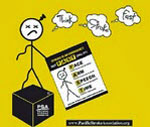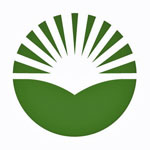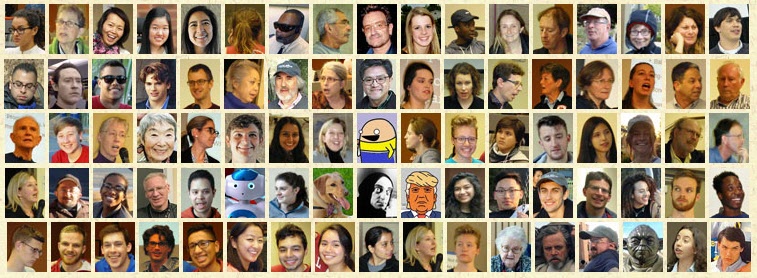| |
|
|

|
|
ATLAS |
|
|
Assistive
Technology
Laboratory
at
Stanford |
|
|
|
Design,
Technology , and Engineering benefitting individuals with disabilities and
older adults in the local community |
September 5, 2019 |
|
|
|
|

Perspectives is the newsletter of the
Stanford course,
Perspectives in Assistive
Technology.
Project Suggestor
Involvement
This issue
describes project suggestor involvement,
announces three upcoming local
events,
and provides information about a Microsoft Research
study.
|
Perspectives in Assistive Technology is a Winter
Quarter Stanford course - preparing for its fourteenth year - that
explores the design, development, and use of assistive technology that benefits
people with disabilities and older adults. It consists of semi-weekly classroom
discussions; lectures by notable professionals, clinicians, and
assistive technology users; tours of local medical, clinical, and
engineering facilities; student project presentations and demonstrations; an
Assistive Technology Faire; and a film screening. |
This course relies on community involvement,
so please
suggest a project based upon an identified problem or challenge.
Introduction to Student
Projects
Previous newsletters described the
benefits of student projects, the
project suggestion submission process,
project requirements, and the
project statement format. This issue lists the
activities expected of project suggestors. 
Project
Involvement
Briefly, what is
the process for considering and submitting project suggestions? -
First identify a specific challenge or problem experienced by a person with a
disability or older adult. Then perform an internet search to confirm that the
problem has not already been adequately addressed. Then carefully review the
project requirements to make
sure the idea complies with all the criteria. Finally submit a short email -
text format is ok - that identifies the user or population affected and briefly
describes the nature of the problem. Include desirable features of a solution,
but do not specify how the device should appear, be built, or solve the problem
- as those are tasks for the student team to consider. It is ok if the problem
affects just one individual.
What happens after
a project suggestion is submitted? - Submitted project suggestions
will be read, reviewed, and considered. Those that meet all the project
requirements and receive my approval will be accepted as candidate team
projects. A project Problem Statement describing the challenge will be
composed for posting on the course website and disseminated as a handout to
students on the first day of class. Refer to
this past year's team candidate project
list for examples of past Problem Statements.
Here is a list of activities that are expected of
project suggestors:
- respond to the
solicitation for student project suggestions
- identify a personal
challenge or problem suitable for a student project
- aid in drafting and
composing the Project Description, including the Design Criteria
- pitch the approved
project(s) to students in class
- meet with the student team
to further their understanding of the problem
- suggest possible ways to
address the problem
- test and evaluate
prototypes
- offer feedback and further
suggestions
- attend project
presentations and demonstrations
Upcoming Local Events
I will be giving three local presentations on the
critical role that older adults and people with disabilities play as they work
with teams of Stanford students to design and fabricate prototype devices that
address the real problems and challenges that people with disabilities and
older adults experience as well as soliciting project suggestions for the
course.

PSA Ability Resource Forum
2019 - The Pacific
Stroke Association (PSA) is excited to present the Ability Resource
Forum 2019. This event offers the most current information on post-stroke
recovery issues, services, and resources to health care professionals, stroke
survivors, caregivers, and family members.
The goal of this two-day program is to share useful
information and resources offered by exhibitors and to provide continuing
education opportunities to clinicians working with stroke survivors.
These events include educational and inspirational
presentations, exhibitors demonstrating latest rehabilitation technology and
products, and fun activities. Come learn about advancements in stroke recovery
and rehabilitation, new devices and modalities, support services, resources,
and practical strategies and tips.
Stroke survivors and caregivers, clinicians, and those
working with people with disabilities as a result of brain injury are
encouraged to attend. Come join us for stroke education, networking, and
fun!
CEUs are offered to clinicians who attend the
educational presentations.
The Ability Resource Forum 2019 will be offered
on separate days at two locations:
| When: |
|
Tuesday, September 17th from 10am to
3pm
Exhibitors & Activities from 10 to 11:30am
Educational Lectures
from 11:30am to 3pm
Presentation time to be determined |
| Where: |
|
Sobrato Conference Center - 350 Twin
Dolphin Dr., Redwood City -
map |
| Information: |
|
Tickets: $49, free for stroke survivors and
their caregivers
Advance
registration is required.
Topics and
Speakers |
| When: |
|
Friday, September 20th from 10am to
3pm
Exhibitors & Activities from 10 to 11:30am
Educational Lectures
from 11:30am to 3pm |
| Where: |
|
Santa Clara Valley Medical Center - 751 S
Bascom Ave., San Jose -
map |
| Information: |
|
Tickets: $49, free for stroke survivors and
their caregivers
Advance
registration is required.
Topics and
Speakers |
|

Active Aging Week -
Active Aging Week is the annual health promotion event for older adults
organized by the International Council on Active
Aging. The goal of Active Aging Week is to give as many older adults
as possible the means to experience activities and exercise in a safe,
friendly, and fun atmosphere.
The City of Sunnyvale supports wellness for older adults
and is inviting the community to participate. Health, fitness, and wellness
workshops, classes, lectures, and other activities are planned.
| When: |
|
Active Aging Week: Monday, September
23rd to Friday, September 27th
Presentation: Tuesday, September 24th at
10am |
| Where: |
|
Sunnyvale Senior Center - 550 East
Remington Dr., Sunnyvale -
map |
| Information: |
|
This free event is open to adults 50 years
and older. More information will be forthcoming |
|

Senior Planet @
Avenidas - Senior Planet
celebrates aging by sharing information and resources that support aging with
attitude, and helps people who were born long before the digital revolution to
stay engaged and active by bringing a digital-technology focus to a range of
topics: news, health, sex and dating, art and design, senior style, travel, and
entertainment.
Avenidas and Older Adults
Technology Services (OATS) have partnered to launch Senior Planet @
Avenidas! Senior Planet is an award-winning program where people 60+ who
are interested in technology can connect, learn, and grow. Located in
Avenidas’ newly-renovated facility in downtown Palo Alto, this resource is
set to become a critical part of Silicon Valley’s aging, technology, and
entrepreneurship scenes.
| When: |
|
Wednesday, September 25th from 2 to 3pm |
| Where: |
|
Avenidas - 450 Bryant, Palo Alto - Senior
Planet Room -
map |
| Information: |
|
Admission is free - but please
RSVP |
|
Microsoft Research Study on
Accessible Virtual Reality
"Microsoft Research is exploring how to improve the
accessibility of virtual reality systems for people who experience tremor,
muscle weakness, fatigue, limited mobility in their hands, arms or legs, people
with missing fingers or limbs, and people with conditions that impact motor
abilities such as cerebral palsy, multiple sclerosis, Parkinson’s, or
stroke."
"As part of this effort, we are conducting an interview
study with adults to learn about their thoughts on, and experiences with,
virtual reality systems. Prior experience with virtual reality is not required.
The study will be conducted for two weeks spanning August 26th to September
6th and will last approximately 90 minutes. Participants will receive a
$75 Amazon gift card for their participation. Interviews can be conducted over
Skype, Zoom, or another video conference platform. If you live in the Seattle,
Washington area, we can conduct the interview at our research lab in
Redmond. Up to $50 can be added to the gift card (if needed) to reimburse
for transportation expenses to get to our Redmond offices. Participation is
confidential; all data from our study will be anonymized. If there are any
questions, please contact the lead researcher,
Martez Mott."
Eligibility Criteria:
- You are 18 years of age or
older
- You currently reside in
the United States of America
- You experience motor
difficulties that affect your hands, arms, legs, or neck
Other
Support the course -
Funding in any amount for the course and student projects is always welcomed.
Monetary gifts support approved project expenses, administrative costs,
honoraria for guest lecturers, and the end-of-term celebration. Refer to the
Course and Project Support
webpage for more information.
Email questions, comments, or
suggestions - Please email
me if you have general questions, comments, or suggestions regarding the
course. Thank you again for your interest.
Dave
|

To unsubscribe from this newsletter, please email
Dave. |
|






